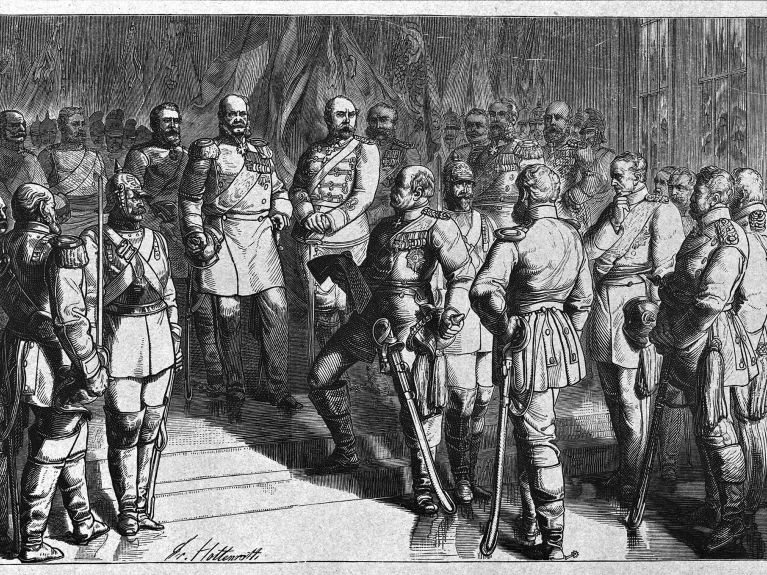1871: Founding of the German Reich
The Second German Reich was a constitutional monarchy. The Reichstag was restructured as the people's elected representation, albeit with restricted rights.

In the 1860s, however, Germany likewise took the decision to prioritize unity over freedom. This was the result of the “revolution from above”, by which Otto von Bismarck (1815–1898) , the Prussian Prime Minister, solved the German Question in his own way. The Prussian constitutional conflict, which lasted from 1862 to 1866, enabled him to solve the question of domestic power in favor of the Executive and against Parliament; in terms of foreign policy a solution to the question of power was delivered by Prussian victory in 1866 in the “smaller Germany” war, i.e., the exclusion of Austria, and in the Franco-Prussian war of 1870/1, against the France of Napoleon III, the power that until then had vetoed the creation of a German nation state.
The victory over France in 1870/71 led to the foundation of the Second German Reich and the proclamation in Versailles of Wilhelm I as German Emperor. Bismarck remained Prime Minister and also became Reich Chancellor. One goal of the 1848 Revolution had thus been achieved: unity. However, the demand for freedom, inasmuch as it denoted a government responsible to parliament, remained unfulfilled. Even if it had been his intention Bismarck would have been unable to solve the freedom question in the interest of the Liberals: Ceding power to Parliament fundamentally contradicted not only the interests of the ruling classes in old Prussia – of his dynasty, his army, the landed gentry, and high-ranking civil servants. It also contradicted the interests of the other German states, at the top of the list Bavaria, Saxony, and Württemberg. In the form of the Bundesrat they were entitled to a major share of the executive power in the German Reich and were not inclined to forego this power and grant it to the Reichstag. The Reichstag was elected on the basis of universal and equal suffrage by men who had reached the age of majority. This was in line with the Reich Constitution of 1849, which never actually came into power and gave the Germans more democratic rights than those enjoyed at the time by the citizens of liberal model monarchies such as Great Britain and Belgium.
As a result one can talk of a partial democratization of Germany in the 19th century, or in relation to the total life span of the German Reich, of dissynchronic democratization: Suffrage was democratized relatively early on, the system of government in the narrow sense, late.


